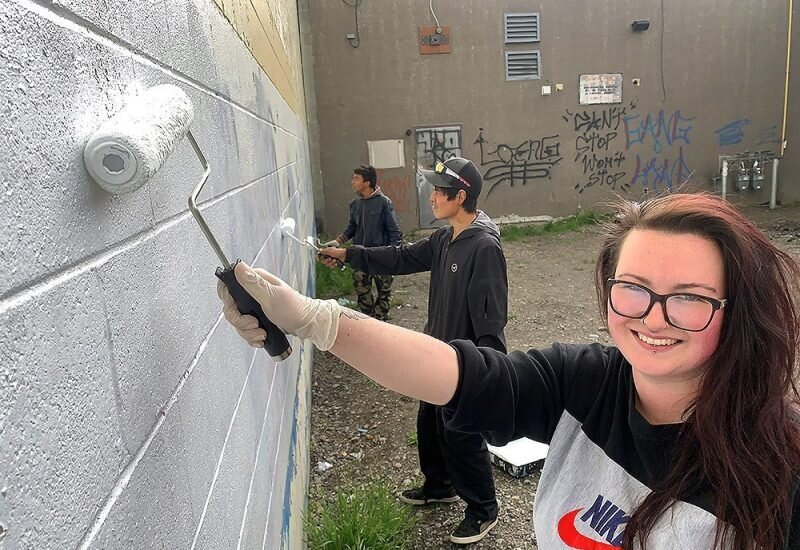By Courtney Hayhurst
Around the world, and in North America in particular, Indigenous rights, needs, and voices are being heard louder and stronger than ever before. In Prince George this has been noticed happening in many aspects of the community, but most recently Prince George has been making strides within the school district. Not only has the education curriculum expanded to include more local Indigenous topics, but the past few months has seen incredible conversations between members of Lheidli T’enneh, Mcleod Lake Indian Band, and SD57.
Lheidli T’enneh members and the Dayi (Chief) started conversations with SD57 to propose that a seat on the school board be reserved for local members of the Lheidli T’enneh. September of this year, 2020, saw this proposal expanded with support of Mcleod Lake Indian Band, which resulted in the proposal of two new additional seats within the school board to be reserved for their representatives. These discussions have led to full, unanimous support from every current board member approving of these changes. Now, all that waits is receiving approval from the Provincial government.
In an interview, Lheidli T’enneh Dayi, Clayton Pountney, offers his perspective on the importance of education in Indigenous communities, and what this might mean for Prince George, the Province, and Indigenous people. Dayi Pountney remarks not just on the importance of inclusive education for indigenous youth, but also about the importance of building communities and working together.
Beverly Best, Manager of Aboriginal Student Engagement at UNBC and member of Stellat’en First Nation, also offers her perspective on issues of education and inclusion in a separate interview. Beverly talks about how this request is not just about education, and that it is also about inclusion; inclusion of indigenous history, people, and culture, and making room for indigenous needs and voices to be heard, and valued, as equal to all others.
In education, Indigenous perspectives, history, and teachings have been excluded for many years through racist laws, bills, and residential schools. In the article “Characteristics of Indigenous Healing Strategies in Canada” published in 2019 in the JBI Database of Systematic Reviews and Implementation Reports, author Ziwa Yu states that Indigenous people have had their teachings, cultures, and languages attacked by these racist institutions and societal structures, which left many “... with a confused cultural identity that is compounded with shame, self-hatred and powerlessness”. According to the article “Beyond Recovery: Colonization, Health and Healing for Indigenous People in Canada” published in2009 in the International Journal of Mental Health and Addiction, authors Lavalee and Poole argue that the colonial practices that have (and still do) occur in Canada such as the 60’s scoop, child welfare, and land reclamations “...contribute to denigration of identity, cultural genocide, grief, anger, hopelessness and helplessness. All of these factors are linked to suicide, mental health and recovery”.
Research has been produced by academics to try to understand what impacts these colonial practices from the past have on Indigenous people now. From these studies, it has been found “...that being Native meant you are somehow less than and do not deserve good things” (Lavallee and Poole), and that those who fully identify as Indigenous often feel as if they “...do not fit societies’ stereotypical view of what an Indian looks like” (Lavalee and Poole), which serves to further degrade their identities.
Healing from these traumas is difficult, not just for an individual, but at an institutional level as well. Academics argue that “In order for healing to occur, Indigenous peoples need to be involved in retelling the colonial history and acknowledging the impact of historical trauma” (Yu), but in order for this to occur, there must be participation and buy-in from municipal, provincial, and federal bodies. These organizations need to acknowledge and validate the “... Indigenous cultural activities characterized by an ongoing connection to the past, based on specific beliefs, values and practices that go back to the time prior to European contact” (Yu), while still taking into consideration that “... the pathway to healing is inherently variable and highly relevant to personal agency and individual readiness” (Yu).
Indigenous healing is a broad, complex, and difficult topic to tackle. Not only are there difficulties in personal healing journeys regarding mental health and identity, but institutions and entire communities also have to combat how to support each individual journey to healing as well. In Prince George, part of the way the community has facilitated these difficulties is by building connections between communities and bringing Indigenous voices and perspectives into positions of power. An example of this is the potential addition of Indigenous seats to the SD57 school board.
For both Dayi Pountney and Beverly Best, education is not only important to the indigenous members in the community. In their opinions, building these connections, including indigenous members, voices, stories, and teachings into education and its governing body helps to build a more inclusive, holistic, and knowledgeable community. Including local Indigenous perspectives into a position on the school board allows for struggles surrounding identity to start being healed through the sharing of their histories and perspectives to all members of the community.
Listen to the interviews with DayiClayton Pountney and Beverly Best below to learn more about what it means to be represented and included in the community.






